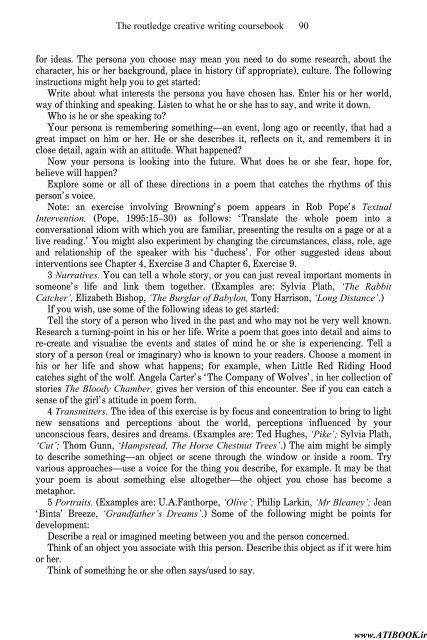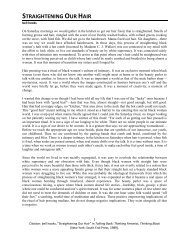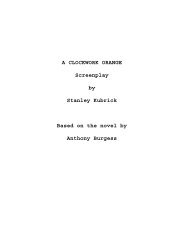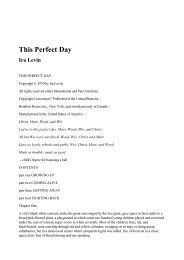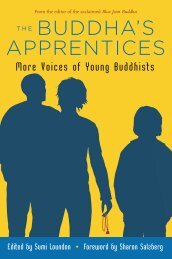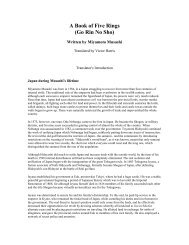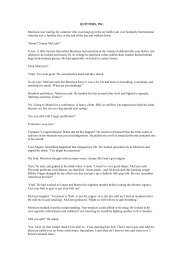9780415317856_the_routledge_creative_writing_coursebook
9780415317856_the_routledge_creative_writing_coursebook
9780415317856_the_routledge_creative_writing_coursebook
Create successful ePaper yourself
Turn your PDF publications into a flip-book with our unique Google optimized e-Paper software.
www.ATIBOOK.irThe <strong>routledge</strong> <strong>creative</strong> <strong>writing</strong> <strong>coursebook</strong> 90for ideas. The persona you choose may mean you need to do some research, about <strong>the</strong>character, his or her background, place in history (if appropriate), culture. The followinginstructions might help you to get started:Write about what interests <strong>the</strong> persona you have chosen has. Enter his or her world,way of thinking and speaking. Listen to what he or she has to say, and write it down.Who is he or she speaking to?Your persona is remembering something—an event, long ago or recently, that had agreat impact on him or her. He or she describes it, reflects on it, and remembers it inclose detail, again with an attitude. What happened?Now your persona is looking into <strong>the</strong> future. What does he or she fear, hope for,believe will happen?Explore some or all of <strong>the</strong>se directions in a poem that catches <strong>the</strong> rhythms of thisperson’s voice.Note: an exercise involving Browning’s poem appears in Rob Pope’s TextualIntervention, (Pope, 1995:15–30) as follows: ‘Translate <strong>the</strong> whole poem into aconversational idiom with which you are familiar, presenting <strong>the</strong> results on a page or at alive reading.’ You might also experiment by changing <strong>the</strong> circumstances, class, role, ageand relationship of <strong>the</strong> speaker with his ‘duchess’. For o<strong>the</strong>r suggested ideas aboutinterventions see Chapter 4, Exercise 3 and Chapter 6, Exercise 9.3 Narratives. You can tell a whole story, or you can just reveal important moments insomeone’s life and link <strong>the</strong>m toge<strong>the</strong>r. (Examples are: Sylvia Plath, ‘The RabbitCatcher’, Elizabeth Bishop, ‘The Burglar of Babylon, Tony Harrison, ‘Long Distance’.)If you wish, use some of <strong>the</strong> following ideas to get started:Tell <strong>the</strong> story of a person who lived in <strong>the</strong> past and who may not be very well known.Research a turning-point in his or her life. Write a poem that goes into detail and aims tore-create and visualise <strong>the</strong> events and states of mind he or she is experiencing. Tell astory of a person (real or imaginary) who is known to your readers. Choose a moment inhis or her life and show what happens; for example, when Little Red Riding Hoodcatches sight of <strong>the</strong> wolf. Angela Carter’s ‘The Company of Wolves’, in her collection ofstories The Bloody Chamber, gives her version of this encounter. See if you can catch asense of <strong>the</strong> girl’s attitude in poem form.4 Transmitters. The idea of this exercise is by focus and concentration to bring to lightnew sensations and perceptions about <strong>the</strong> world, perceptions influenced by yourunconscious fears, desires and dreams. (Examples are: Ted Hughes, ‘Pike’; Sylvia Plath,‘Cut’; Thom Gunn, ‘Hampstead, The Horse Chestnut Trees’.) The aim might be simplyto describe something—an object or scene through <strong>the</strong> window or inside a room. Tryvarious approaches—use a voice for <strong>the</strong> thing you describe, for example. It may be thatyour poem is about something else altoge<strong>the</strong>r—<strong>the</strong> object you chose has become ametaphor.5 Portraits. (Examples are: U.A.Fanthorpe, ‘Olive’; Philip Larkin, ‘Mr Bleaney’; Jean‘Binta’ Breeze, ‘Grandfa<strong>the</strong>r’s Dreams’.) Some of <strong>the</strong> following might be points fordevelopment:Describe a real or imagined meeting between you and <strong>the</strong> person concerned.Think of an object you associate with this person. Describe this object as if it were himor her.Think of something he or she often says/used to say.


